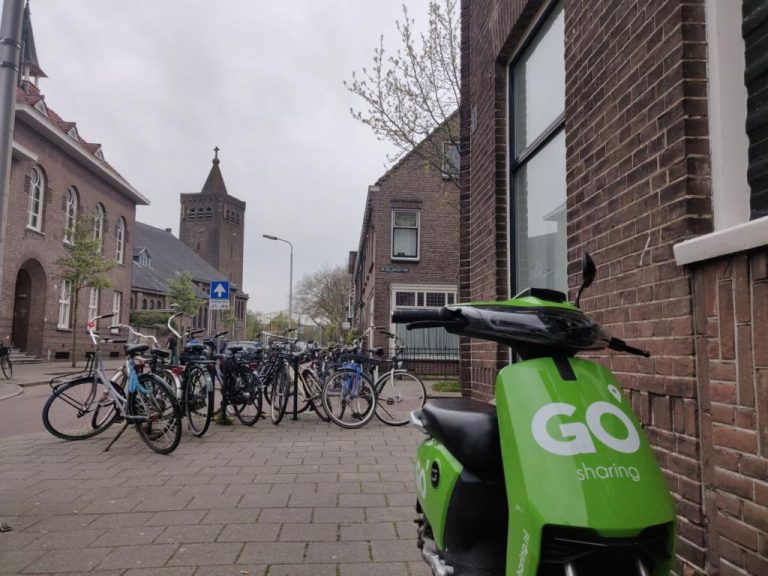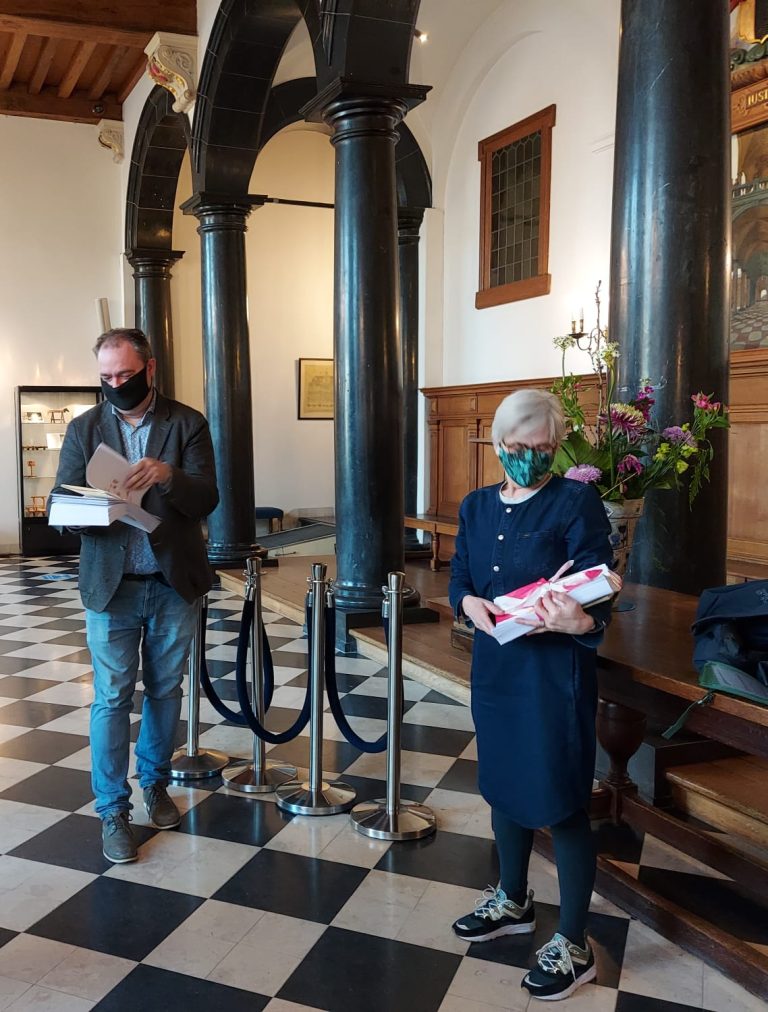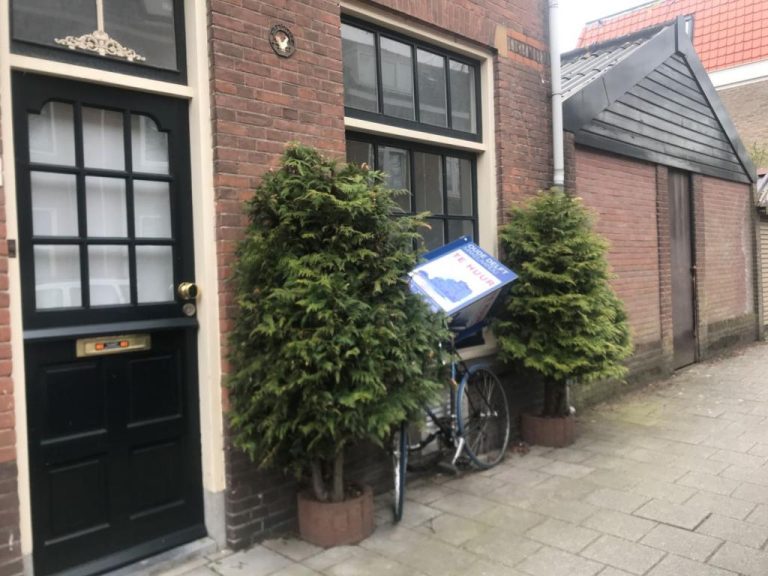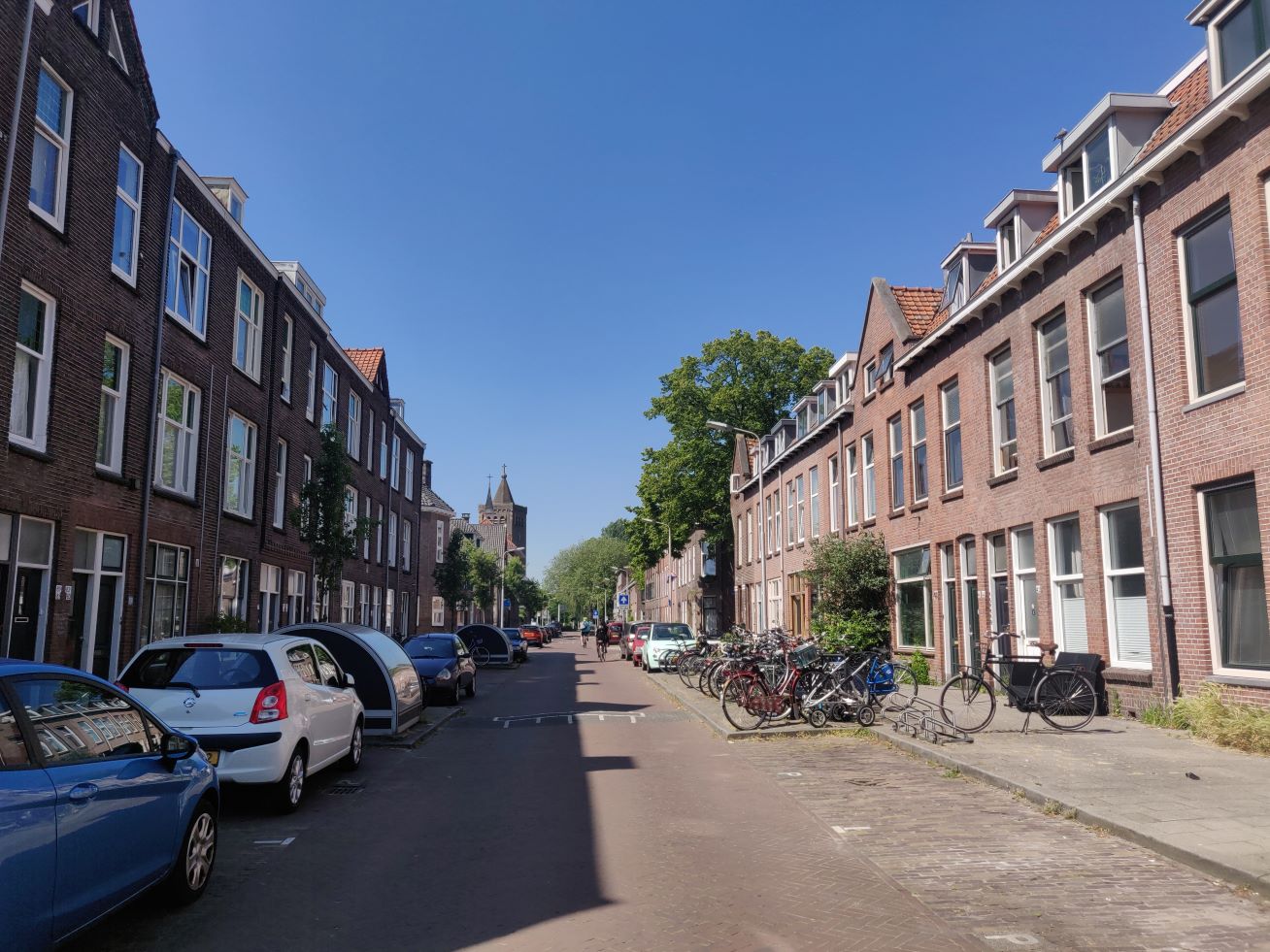The Delft Municipal Council will vote on the housing ordinance on Thursday. If accepted, houses smaller than 180 m2 may not be split into separate units anymore.
In the Simonsstraat some long-term residents feel like outsiders. (Photo: Marjolein van der Veldt)
It would be welcome for a group of Wippolder residents. Over the last few years, they have seen the number of student houses – and thus problems caused by students – in their neighbourhood rise sharply.
Anja opens the front door. Does she want to share her experiences about trouble-making students? Her eyes narrow and she brings her hand to her forehead. “I’ve had it up to here,” she says. Anja and her husband Richard have lived in the neighbourhood of Wippolder, next to TU Delft campus, for years. In the Simonsstraat to be precise. They bought a terrace house as a young couple, saw their children grow up there, and always had good relations with the other neighbourhood residents. But they have lost a lot of the pleasure of living there. They have endured a lot of problems from the increasing number of students. Anja points to two young women who are sitting in the sun on the other side of the road and having a very loud conversation. A third woman cycles up to them and calls out to them. Anja says “This sort of shouting never stops.” She sighs. She and her husband also have problems with their immediate neighbours – a student house with five male residents. “They are like children. They run around the house, put the music on really loud and talk deep into the night in a room that adjoins our bedroom. These are noisy houses so we sometimes don’t get any sleep at all.”
The Wippolder is one of the neighbourhoods in Delft with the most student houses. Of the 7,997 ‘residential units’ there, 3,739 are officially registered as ‘student units’. This equates to 47% of the total. The average in Delft is 19%. For years, this high proportion of student houses has pushed the residents of Wippolder to regularly bring up problems caused by students at municipal public consultation sessions or in public announcements by the Municipality. ‘Bewoners Wippolder zijn ‘terreurzaaiende studenten onder invloed’ spuugzat’ (residents of Wippolder are sick and tired of ‘terrorising students under the influence’) was a headline in the AD Delft (in Dutch). Soon after that, De Telegraaf newspaper published a similar article: ‘Studentenoverlast in Delft: kots op straat, herrie en drugsfeesten’ (problems with students in Delft: vomit on the street, noise and drugs parties, in Dutch). Over the last few months, Delta went to Wippolder several times with one burning question – are the problems as bad as the newspapers suggest? The answer appears to depend on where you live in Wippolder.
Parked bicycles
A large number of the residents that Delta spoke to hear music or shouting once in a while from parties, a barbecue or a social evening at home here and there. But is that really a problem? Not that. Resident Rietje is enjoying the sun on a bench outside. “You do hear noise sometimes, but I’ve been living here since 1977 and have only had a real complaint once.” She points to a house a little further down the street. “That house was turned into rented rooms last year and since then, there was one very noisy student living there. He gave our neighbours a lot of problems, but luckily he has been evicted.” Next to her on the bench, Toos, her neighbour from across the street, lights another cigarette. She too hears noise from parties or barbecues sometimes, but does not really have a lot of problems. “They bring life to the neighbourhood. That’s nice don’t you think?” But she does have problems with their bicycles. “They just dump their bikes anywhere on the pavement so you can’t get past with a pram or a Zimmer frame.”


Bicycles are parked everywhere on the pavements. (Photo: Marjolein van der Veldt)
The contact between residents and students in several areas in the neighbourhood is good, say both students and residents. Student Fleur says “My downstairs neighbour had my telephone number if we make too much noise. We also sometimes app about other things, but she has never alerted us to problems.” Neighbourhood resident Michael has lived in Wippolder for about five years. “I’ve had students living above me all that time. There were two women at first and they were very quiet. Now there are a couple of men. These are noisy houses so I hear it if they talk. But I have contact with them so if it’s really noisy I just say so.”
The contact between Anja and Richard and the adjoining student house is less good. The reason for this? Years of piled up frustration. “Don’t get me wrong,” says Anja, “our neighbours are friendly guys who greet you on the street, but it’s come to the point that as soon as I see a student I see red. And if they give any kind of trouble, I can’t do anything else but be angry and shout.” The five students who live next door to the couple confirm that the contact is rocky. “At first we tried to discuss it with them but they just started shouting,” one of them says. They do not think that all Anja and Richard’s requests are reasonable. “The bar at which they start complaining as become lower and lower. They want us to take off our shoes when we come in as the houses are so noisy, for example. But I want to be able to wear my shoes in my own room.”
Almost 200 reports in one year
Residents who experience problems can report it to the Municipality of Delft’s Woonoverlast desk. The desk received 192 reports of problems caused by students last year, of which 80 came from Wippolder. These figures only include reports made by residents to the Municipality. Reports to the police are in a different system. In parts of the Hendrikstraat, the Delfgauwseweg and the Prins Mauritsstraat, the situation is so bad that residents decided to collect their complaints in a file of 335 pages that Delta has seen.
The file, that weighs 1.9 kilos, does not lie. “Our daughter of four years old grew up among vomit and broken beer bottles on the pavement,” writes one resident. Other neighbourhood residents write about students who vomit from the balcony onto the street, throw their cigarette butts down on the street, dump rubbish and benches in the front gardens and regularly make a lot of noise at night. An app or ringing the doorbell do not help, write several residents. “I got up in the middle of the night. I had a fierce discussion with the students. They didn’t get it at all and neither do they want to listen. It’s the same story every time.” This is not about one-time incidents. What emerges from the list of reports of problems in the file is that the noise and mess go on week after week. After yet another night of noise, the residents who email the Municipality or the community police officer sound desperate, angry and tired. Some residents even book a hotel room for the night on public holidays such as New Year’s Eve just so that they can get a good night’s sleep.


One thing stands out in the file that the neighbourhood residents handed to the Municipality earlier this year – that they do not feel that they are taken seriously. Not by the troublesome student houses, the police nor the Municipality of Delft. “It seems as if these institutions are ruled by a culture of placation and appeasement. While they may respond to emails from residents and sometimes discuss it with them, they do not do anything,” says resident Marie-José who does not have problems with the students herself but helped residents compile the file. Current legislation does not allow for the closing of student houses. But when they receive reports, the police can go and investigate and either hand out fines or confiscate the sound equipment. The Municipality of Delft has two civil servants who work on problems caused by students and who can start an intervention process. How often this was done in 2020 is unclear. For most questions, a police spokesperson referred Delta to the Municipality. The Municipality of Delft did say that some intervention processes were started last year, but could not say how many.
During the Municipal Council’s meeting last week, Mayor Marja van Bijsterveldt asked the police to patrol more stringently and to seek other measures such as using more BOAs (police community support officers) and strengthening local regulations. “I have become increasingly concerned over the last six months,” she explained. “If I receive 23 reports about problems caused by student houses in just one weekend, it is not an exception anymore.” She recognises that the problems are currently not being dealt with sufficiently. “It is clearly evident that we need to find ways to do even more.”
‘Antisocial’
Delta shared the experiences of residents from the file with TU Delft. Vice Rector Magnificus Rob Mudde has just one word: antisocial. “We were all young once and we all know that you then do not take things as seriously. You think that the others are being difficult or that it does not matter. But you must listen to residents if they are experiencing problems because of your behaviour. And if the neighbours complain to you after a party, you must apologise immediately”, he says in an interview with Delta. Mudde understands that some residents are desperate. “They do not complain for nothing. A lot of noise once a year in a student city is irritating, but it’s doable. But having this week after week? That must stop.” TU Delft, the Municipality, the police, large housing associations such as DUWO and student associations discuss these types of problems several times a year. Mudde says that “Officially, TU Delft is not responsible but it does feel responsible. And if there are continual problems somewhere, we want to hear about them.” He continues. “What makes it difficult is that apart from a fatherly discussion with students like this, there is little a university can do.” The TU Delft associations are, however, trying to address their members about these kinds of issues. They are also doing this with student houses that are viewed as association houses even if they are not so. “We suggest to the associations’ boards that they drop by and talk with the residents.” Mudde admits that TU Delft cannot reach every student through associations. “Delft is a well organised student city that has a lot of student associations, but still only 30% to 40% of the students are members.”
Once in a while the residents themselves approach TU Delft. Alex Lokhorst, Liason Community Relations at TU Delft, discusses the issue with them. “They may say that they live below, next door to or opposite students. Some are worried that their houses lose value. Others contact me because of problems with students. The discussions do not always lead to solutions, but it is important to continue having the discussions.”


This family house was turned into several student rooms recently. (Photo: Delta)
‘An increase in dividing houses into rooms’
While many students have lived in Wippolder for years, the residents that Delta spoke to noted the high number of houses in their neighbourhood that have been divided into rooms over the last two years. And this is despite the conversion permit that the Municipality of Delft introduced in 2017 to avoid house division. This is not reflected in the official figures of the Municipality of Delft. According to figures that the Municipality requested from the investigation agency Explica, in 2019 the neighbourhood had 238 houses divided into rooms (in Dutch). The Municipality itself estimated the number for 2020. “The houses comprised owned properties and private rental properties and excluded student homes. These houses only included those in which three or more single or co-habiting persons aged 18 years or older resided. In the whole of Delft on 1-1-2020, this was 1,702 homes of which 218 are in the Wippolder neighbourhood.” This points to a decrease. The figures for 1 January onwards are not yet known. A Municipality spokesperson says that it is impossible to have an accurate picture of where TU Delft students live as the relevant educational institutions may not share lists of addresses. This makes Marie-José critical about the figures. “Our dossier mentoins many addresses in Wippolder that are not registered at the Municipality as student houses but have become student houses in the last few years. Luckily the Municipality is taking action now. According to SP (socialist party) Councillor Salwan al Jaberi, the introduction of the conversion permits for dividing houses in the Wippolder actually caused this situation. “By keeping the boundary for permits to divide up residences below EUR 265,000 and banned for those above EUR 265,000, investors have targeted the cheaper houses such as those in the Wippolder area,” he said last week Thursday at the Municipal Council’s meeting.
‘The significant difference is that the students are passing through and we live here’
Neighbourhood residents Anja and Richard would like to see TU Delft house more students on its campus to reduce both the problems caused by students and the level of house division in the future. “TU Delft has brought many students to Delft, so they should move the problems there,” they say. At the moment, TU Delft’s campus has 1,000 student homes. Mudde says that he “understands that the neighbourhood residents want this, but building more buildings is not as easy as you would think. Universities cannot build themselves and have to find commercial companies that are interested in doing so. There are often reasons that make it unviable for them. Further, there must be enough space left for education, research and companies on campus.” TU Delft and organisations such as DUWO are now looking at surrounding municipalities such as Schiedam, Rijswijk and Pijnacker-Nootdorp where student housing may be economically viable.
Marie-José believes that both TU Delft and the students are important for Delft. “But the significant difference is that the students are passing through and we live here.” She argues for a limit to the number of student homes in every neighbourhood. “Some areas are falling apart because of the high numbers of students who live there. Some desperate residents are thinking about moving out of Wippolder.” Whatever happens, it is too late for Anja and Richard. “The relations in the neighbourhood used to be good and there was a pleasant atmosphere. But not anymore. The whole street is now filled with student houses. We feel like outsiders here.”
Annebelle de Bruijn and Marjolein van der Veldt
- Also read the interview on this subject with Rob Mudde and Alex Lokhorst:
‘Being a good neighbour is not a request, it is an order’



Comments are closed.